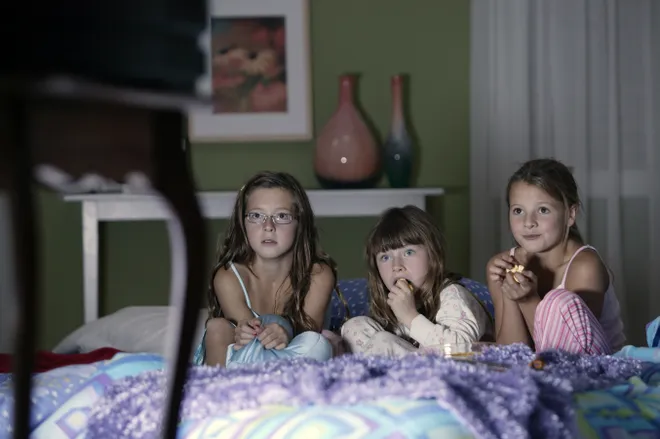I said no to my daughter's sleepover invitation. Sexual violence is just too rampant.
I recently wrote about whether to allow my 8-year-old daughter to attend sleepovers, and something about my dilemma clicked with many readers. I got emails from as far away as Australia, from parents and grandparents, telling me that they, too, had strong opinions about the "great sleepover debate."
I was touched by the reactions to the column. Several parents and grandparents wrote to tell me that it sounded like I was doing great as a mom (never hurts to hear that). I had only a few mean emails, which is rare for an opinion column. I had emails from fathers and grandfathers, police officers and lawyers, stay-at-home mothers and teachers. And they wanted to let me know that they, too, understand what it is like to take on a determined 8-year-old and push back on social pressure to do what other parents might be doing.
One father wrote to say, "My kids didn’t come with an owner’s manual, so if anybody has a spare pls send me the PDF, otherwise I’m going to make it up as I go."
I couldn't agree more.
A mother wrote to say, "Nothing good happens after midnight."
I can say from experience: That is very true.
Another woman wrote to tell me that she avoided the sleepover argument by starting a Girls Scouts troop and organizing group sleepovers, where adults supervised and participated in the sleepover. That sounded like a good solution.
And for the readers who wanted to know what I told my daughter in the end, before I got all this great advice from people writing in, it was this: "If you're just going to sleep, then you can sleep at home."
Parenting styles:My 8-year-old daughter got her first sleepover invite. There's no way she's going.
I let her go to her friend's house for a while, and I stayed to have a glass of wine with the mother, and then we left, together.
But what you say to your kid, or what you decide to do about a sleepover invitation, is only half of the issue. The real issue we need to talk about here is sexual violence.
Sleepover debate is about keeping kids safe from sexual violence
When I wrote about my dilemma of whether to let my daughter go to a sleepover, it was for me about the risk of sexual violence. It's hard to talk about sexual violence – it always has been. It's still a taboo subject in most households. But avoiding talking about it doesn't make it go away.

Many people wrote to share stories of their experiences with sexual violence, explaining that was the reason they wanted their kids home at night.
One man told me that he had been a victim of sexual violence as a child in the foster care system. He said he never let his kids attend sleepovers, but he could never bring himself to tell them why because he felt that he would have to tell them what happened to him.
Oklahoma failed this 16-year-old:The world Nex Benedict deserved isn't hard to create. It just takes love and respect.
One reader wrote to say that I didn't need to bring up the issue of rape or sexual abuse with my young daughter, and I wholeheartedly agree. She is only 8. I do, however, talk to her about why no one can touch her in a way that makes her feel bad, and that she must tell me if anything "bad" ever happens – that I will never get angry with her for telling me the truth.
If you think such concerns are irrational, I'd point you to a still-developing story out of Oregon, where a father is accused of drugging three 12-year-old girls who attended a sleepover with his daughter. The father was indicted on nine counts last month.
The reality is that sexual abuse of children is rampant. According to RAINN (Rape, Abuse & Incest National Network):
- 1 in 9 girls and 1 in 20 boys under the age of 18 are victims of sexual abuse or assault.
- 82% of victims under 18 are female.
- Females ages 16-19 are four times more likely than the general population to be victims of rape, attempted rape or sexual assault.
The problem is at epidemic levels in the United States. And simply denying a child a sleepover isn't enough to keep them safe.
Kids need to understand that they can talk to their loved ones if anything bad happens to them or someone else they know. As adults, parents, caregivers and guardians, we need to have conversations about consent and bodily integrity, albeit in an age appropriate way, based on facts and expertise. Parents need to talk with one another. Schools need to talk to kids about sexual health and safety.

As I said in the initial column, I know that I can't keep my kids safe from everything, forever. But I am trying my best to keep them safe now, when they are under my care.
Keeping my daughters safe means talking to them about hard topics and setting firm boundaries that cannot be moved simply because my kids really want something – or because everyone tells me it's fine.
Carli Pierson is a digital editor at USA TODAY and an attorney. She recently finished a legal consultancy with Equality Now, an international feminist organization working to eliminate sexual violence and discrimination against women and girls.
Disclaimer: The copyright of this article belongs to the original author. Reposting this article is solely for the purpose of information dissemination and does not constitute any investment advice. If there is any infringement, please contact us immediately. We will make corrections or deletions as necessary. Thank you.







